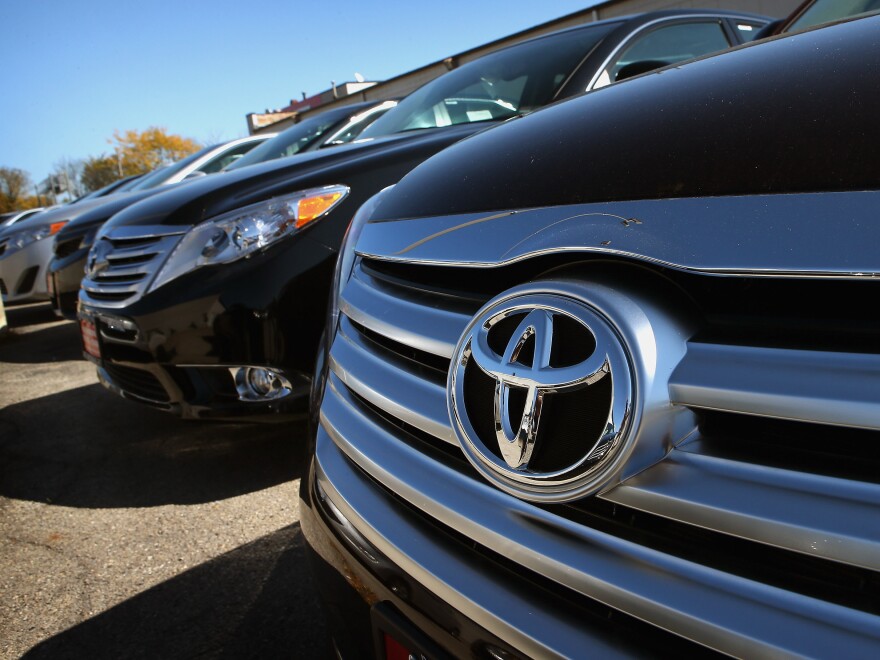Toyota is preparing to build a $1.3 billion electric vehicle battery plant near Greensboro, North Carolina, that will employ at least 1,750 people, government officials said Monday.
Toyota was identified during a morning meeting of the state Economic Investment Committee, which voted to award at least $79 million in incentives to the company if the project is completed.
State officials have scheduled a Monday afternoon news conference to announce a major economic development project at an 1,800-acre plot called the Greensboro-Randolph Megasite, about 20 miles (32 km) southeast of Greensboro. The site is along a four-lane highway with water, sewer and railroad infrastructure already available.
Randolph County elected leaders voted unanimously Monday morning to offer a local incentives package to the expected company that they didn’t immediately identify except as “Project Darwin.”
In October, Toyota announced that it plan to build a new U.S. factory to make batteries for hybrid and fully electric vehicles. The location was to be announced later in the year. The automaker said the plant would start making batteries in 2025, gradually expanding through 2031.
The plant is part of $3.4 billion that Toyota plans to spend in the U.S. on automotive batteries during the next decade. It didn’t detail where the remaining $2.1 billion would be spent, but part of that likely will go for another battery factory.
Toyota will form a new company to run the new plant with Toyota Tsusho, a subsidiary that now makes an array of parts for the automaker. The company also will help Toyota expand its U.S. supply chain, as well as increase its knowledge of lithium-ion auto batteries, Toyota said.
The site near Greensboro is relatively close to many of Toyota's existing U.S. auto assembly plants in Missouri, Kentucky, Indiana, Alabama and Texas. The company has yet to announce where it will build fully electric vehicles for sale in the U.S.
A state Commerce Department official said Toyota Motor Corp. considered sites nine states including North Carolina.
The Randolph County package would result in an estimated $65 million in property tax rebates and the transfer of mega-site land to the company should it invest $1 billion and create at least 1,750 jobs with average salaries of more than $62,000, according to a Randolph economic development official. The return to the company would grow if it a second phase of the project occurs -- a $3 billion investment and more than 3,800 jobs in total.
A economic panel that must approve a separate, state packages of cash awards to companies seeking to build in North Carolina was to meet later Monday morning.
The North Carolina legislature already has promised to spend $135 million on road work and wetland improvements and would reimburse $185 million the company spends on similar upgrades should the second phase occur.
Toyota plans to sell 2 million zero emission hydrogen and battery electric vehicles worldwide per year by 2030. In the U.S., the company plans to sell 1.5 million to 1.8 million vehicles by 2030 that are at least partially electrified.
Currently in the U.S., Toyota offers hydrogen vehicles, hybrids and plug-in hybrid powertrains, but no vehicles powered solely by batteries. That has drawn criticism from environmental groups that accuse the company of dragging its feet on the technology. Toyota says it will have 15 battery electric vehicles for sale globally by 2025.
Toyota says vehicles that operate at least partially on electricity now account for about a quarter of its U.S. sales, and it plans for that to rise to nearly 70% by 2030.
The announcement comes as automakers race to build North American battery factories to supply what is expected to be exponentially increasing demand for electric vehicles as the world transitions away from internal combustion engines.
Stellantis, formerly Fiat Chrysler, has said it will build two battery plants in North America. Ford announced three plants in Kentucky and Tennessee, and General Motors has said it would build four battery cell factories. Only two of those locations have been announced, in Ohio and Tennessee.
The LMC Automotive consulting firm expects U.S. sales of new fully electric vehicles to hit nearly 400,000 this year, almost double last year's figures. But they still make up only about 2.6% of sales. But the firm expects sales to grow to more than 730,000 next year and more than 2 million by 2025. Even at 2 million, EV sales still would be only about 12% of U.S. new vehicle sales.
Earlier this year, President Joe Biden got a commitment from the auto industry to produce electric vehicles for as much as half of U.S. new vehicle sales by 2030.







